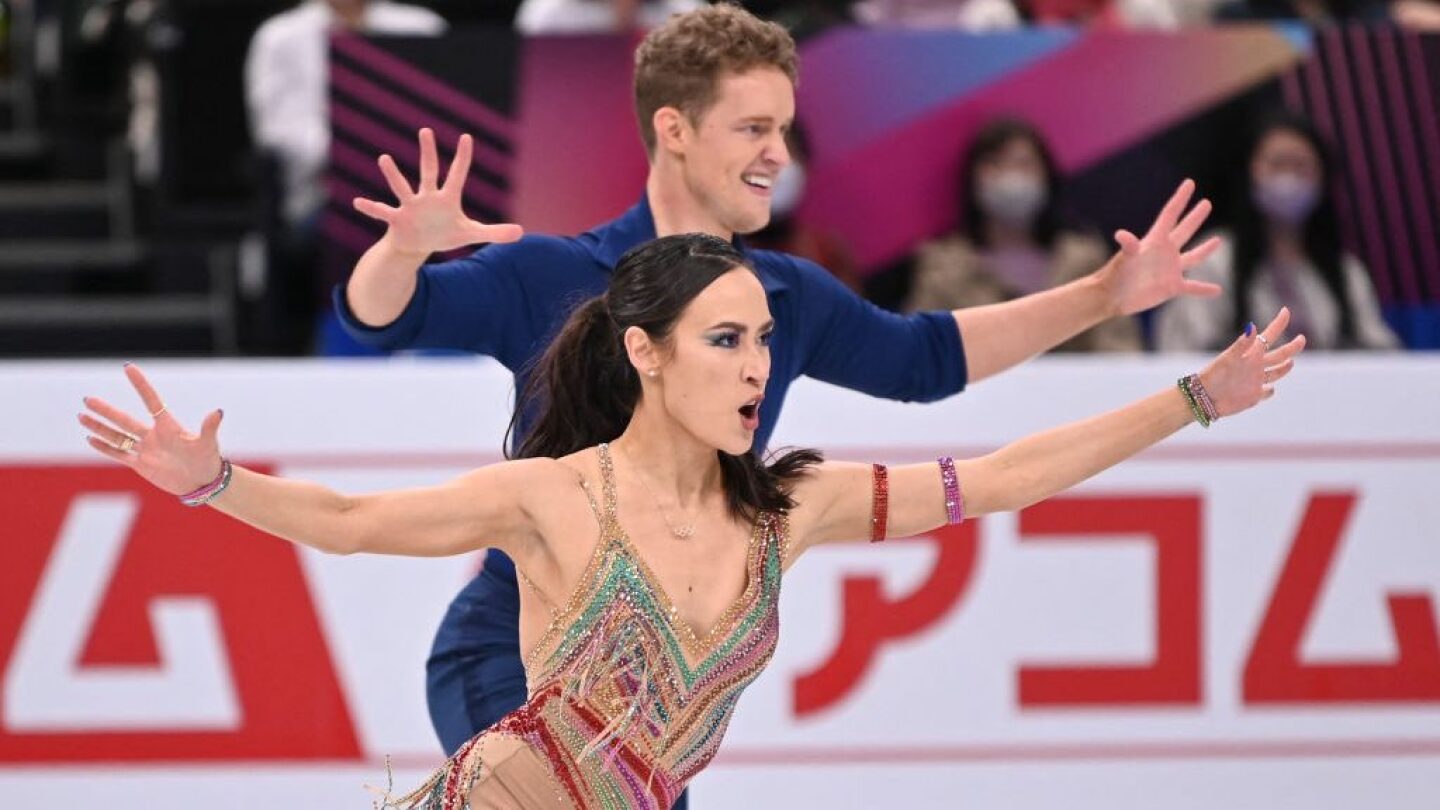Madison Chock and Evan Bates chose “time” as the theme of their free dance this season (set to Pink Floyd music), a word that carries plenty of meaning these days.
“How fleeting it can be, especially in sport,” Chock said. “You really have to cherish the moments you have, and that’s what our program is about. It’s about how we can easily get caught in the rat race that is life at times, and it’s important to remember to slow down.”
Back in March, Chock and Bates won their first world title after 12 years and three Olympics together. At 30 and 34 years old, they became the oldest world champion couple in ice dance history.
They spent last season saying they were undecided not only on a 2026 Winter Olympic run, but also whether to compete in 2023-24.
Chock and Bates evaluated after a spring Stars on Ice tour. They decided to sign up for a 13th season together — a rare streak in ice dance.
They headline Skate America, the first top-level event of the season. NBC Sports and Peacock air coverage starting Friday (broadcast schedule here).
“We were really still very much inspired to keep creating and keep exploring the potential we still feel that we have,” Chock said. “We have still more to give and more that we want to learn.”
Time will tell whether they go all the way to the 2026 Winter Games. They’re still taking it season-by-season.
Bates, already the first U.S. figure skater to compete in four Olympics, can become, at 36, the oldest U.S. Olympic figure skater since 1932, according to Olympedia.org. Chock can become the oldest female U.S. Olympic skater since 1932.
Then there’s the hourglass of the 2022 Olympic team event results.
Chock and Bates and the rest of the U.S. team’s medal boxes are still empty and will remain that way until Russian Kamila Valiyeva’s doping case is adjudicated. A Court of Arbitration for Sport hearing resumes next month.
The U.S. finished second back in February 2022, but could be upgraded to gold if Valiyeva is disqualified due to her positive drug test from a Christmas 2021 sample that was revealed during those Olympics.
To put in perspective what that 20-month wait means in figure skating, Chock and Bates are the only athletes from the nine-member U.S. team still actively competing.
“A lot of that group, that was the culmination of an entire career, an entire lifetime of work was the Beijing Olympics,” Bates said. “So it’s too bad that the medal moment didn’t happen for a lot of us.”
The delay may have played a small role in their decision to keep competing, Bates said. It will be their first Olympic medal, unless, Chock joked, the Valiyeva case is not settled until after the 2026 Winter Games.
“That’s part of the Olympic dream,” to receive a medal at the Games, Bates said. “You see so many montages of, whether it’s Michael Phelps or whoever it may be, standing on the podium and having that emotional moment. To me, that’s kind of baked into the Olympic dream. That is the culmination. It’s not like a delayed gratification thing. It’s like, you have your Olympic triumph. You have your Olympic moment on the podium. So we’ve been talking about still wanting that.”
The IOC typically allows athletes to choose how they receive their medals in reallocation ceremonies months or years after their competitions. Bates said that U.S. team members discussed having their moment at the 2024 Paris Olympics, should the results be made final by then.
In a way, that would mark figure skating’s return to the Summer Games, where it was contested in 1908 and 1920 before the first Winter Olympics in 1924 (also in France).
“That seems to be the prevailing best-case scenario,” Bates said of Paris. “I think it’d be also really nice to have some kind of domestic recognition for the situation that we’ve endured.”
Chock and Bates’ career has been about adapting to circumstances, about things not going to plan.
In 2015, they took silver at the world championships. They didn’t fathom that it would take another eight years to lift their skates one more step up the podium.
Even at this past March’s worlds, where they were favorites, Chock spent the morning before the rhythm dance on a bathroom floor, retching with a stomach bug. Bates caught it and threw up the day of the free dance. They detailed the experience on their podcast, Unlaced.
“It just seemed like it was always going to be a little bit more difficult to get that world title than maybe we thought,” Bates said. “That part of it made it more gratifying when we actually did end up winning.”









